At 73, Val Monroe knows that beauty is more than skin deep. As the dynamic beauty director of Oprah Magazine for sixteen years and a celebrated contributor to The Cut, she has now carved a unique niche as the author of the wildly popular weekly newsletter “How Not To F*ck Up Your Face.” Renowned for her candid, and often witty, insights on beauty, she tackles your most pressing beauty questions with an unfiltered lens. Her refreshingly honest perspective on the beauty industry and the realities of aging not only enlightens but also brings a sense of joy and empowerment to her vast following. Her transition from the glossy pages of traditional publishing to the impactful world of online writing marks an inspiring journey. Dive into her profound reflections on aging gracefully, embracing life in the bustling cities of New York and Tokyo, and discovering the deeper, often overlooked facets of aging.
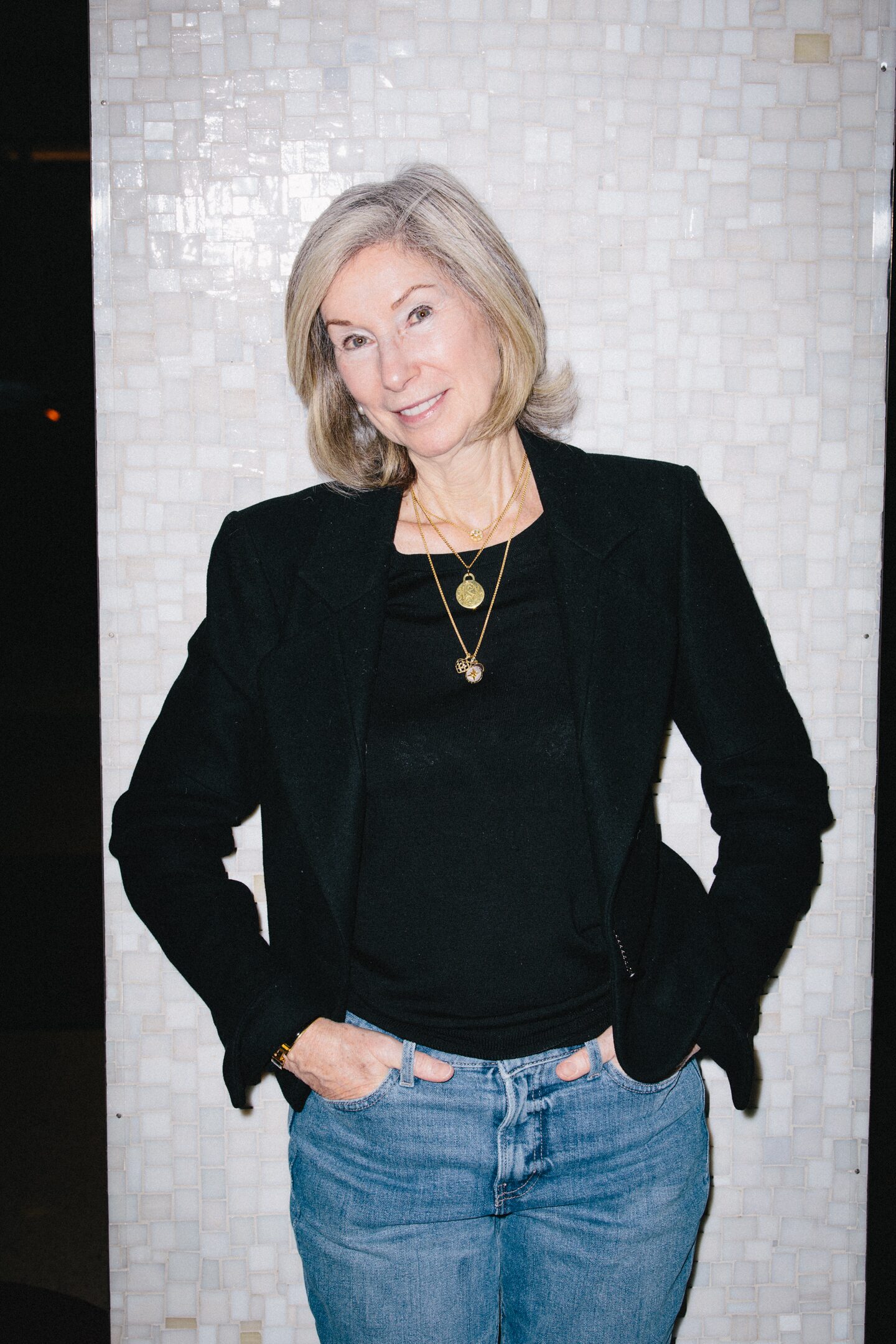
How old are you?
I’m 73.
Where do you live?
Manhattan.
Are you married?
I’m happily separated.
Do you have children?
I have a son who’s about to turn 40, a daughter-in-law, and a five-year-old granddaughter who lives in Tokyo, so I spend three to four months of the year there. Tokyo.
Having spent much of your career as a beauty director at Oprah, you’ve had a front-row seat to evolving beauty standards in the media. How do you perceive societal attitudes toward aging, and how have they changed over the years?
I don’t think they’ve changed very much, which is a segue into how damaging I think they are. We’re a hypersexualized, hyper-youthful culture, which is somehow distilled into a very damaging beauty culture because it presents us with an unrealistic ideal. And that’s been exacerbated by what we see on social media.
“We’re presented with this impossible ideal, so we’re constantly yearning for this goal that is not available to us”
We’re presented with this impossible ideal, so we’re constantly yearning for this goal that is not available to us. I think the older we get, in terms of anti-aging (a phrase I never use when writing about getting older), it’s even more difficult because the further you get from the ideal, the more difficult it is to compete.
I think there’s been a superficial bit of change. Take Paulina, this magnificent woman who has been very honest with us about how she looks without makeup and her challenges as a former model as she ages. But she fits the cultural ideal of what we’re supposed to look like. So, in some way, it does nothing for us civilians, who are just struggling with reality rather than with an example of a remarkably beautiful person.
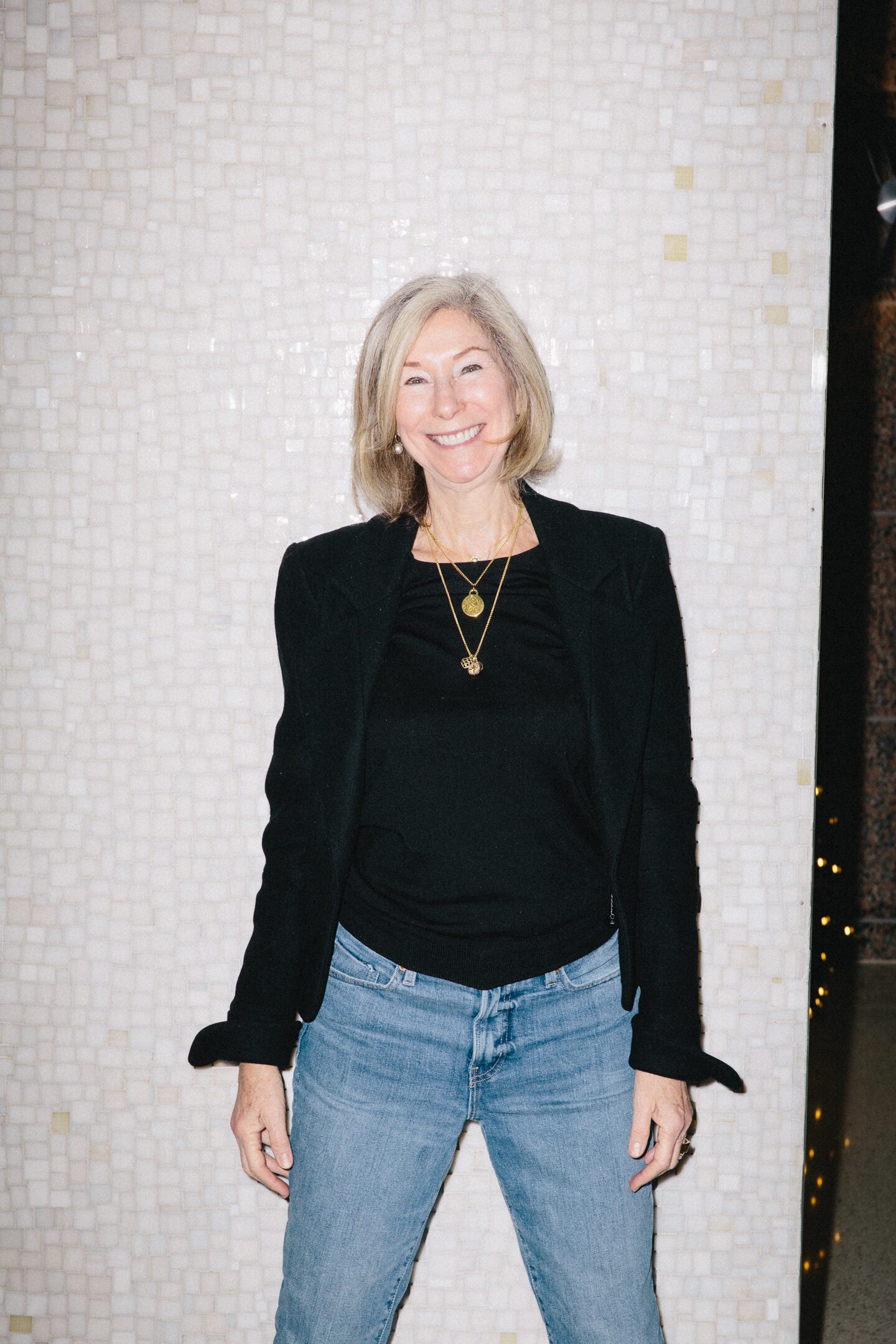
Are men facing the same level of scrutiny?
Some men are as vain as women. But what is very interesting is how we often react to what men look like when they try to minimize their aging by dyeing their hair or having plastic surgery, which is often very feminizing. So, instead of looking more macho or manly, they wind up looking less so.
What do you think about all of this current menopause mania?
I love that menopause talk is in the mainstream. But it’s just another way for marketers to suck everything out of your wallet. And wow, what a gold mine that is.
“I was loathe to leave the magazine because I loved it and I loved the people who worked there”
Any advice for people feeling trapped in a career or life that no longer serves them?
I was loathe to leave the magazine because I loved it and I loved the people who worked there. But the industry changed in such a way that it made me feel uncomfortable. I used to write for the editor-in-chief, and we had this very clear understanding of what our position was and what our message wanted to be. And because of the way the industry changed, it felt like I was writing for the publisher instead because I was just catering to advertisers. And for me, that was it. I was done.
I did some consulting for big companies, which was very lucrative but boring. And I had put together what I had hoped would be a book called How Not to F*ck Up Your Face. And my agent tried to sell it, and she sent it out to, I don’t know, 14 publishers, and they’re all like, “Oh, my God, this is so great. We love it. We don’t know how to sell it.”
And then I noticed that the beauty editors who had gone on to write a couple of books had social media platforms of millions of people. And I had no interest in that. But a friend said, “So there’s this new platform called Substack. Why don’t you see what it’s like?” So, I just started writing, and then suddenly, just by word of mouth, it was like pouring readers, which continues.
It’s still only word of mouth. And now I feel there’s much more freedom in what I’m doing because I can write to people who aren’t as conscious about the deleterious effects of the beauty culture. I can help them see why they might be feeling crappy about themselves as they get older. I think the service aspect of what I do is the most important aspect of my writing.
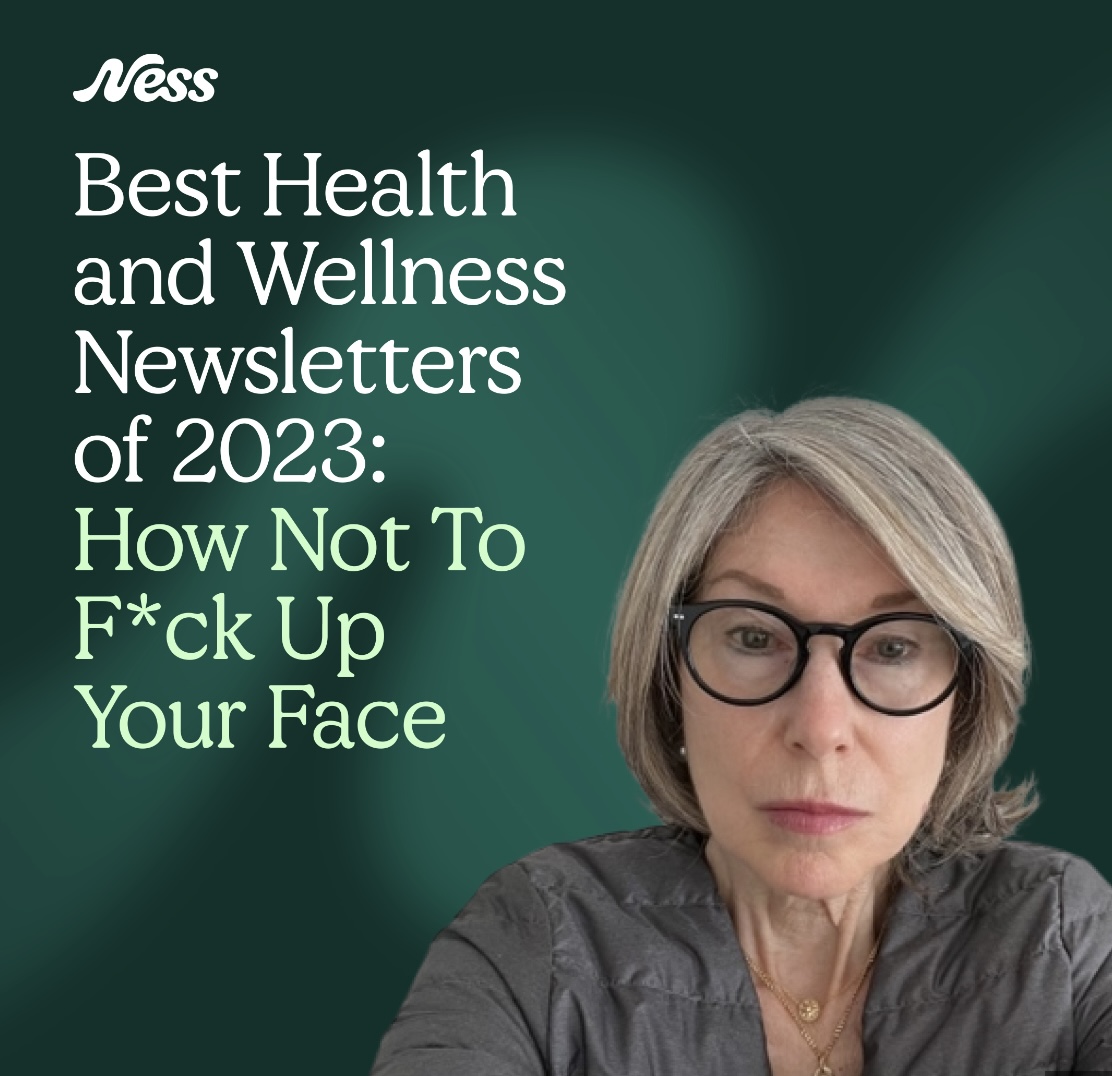
Beauty Routine
What is your beauty routine?
I use three products. The less you use, the better it is for your skin. I use a gentle non-soap cleanser, like CeraVe.
The most important product you can put on your skin every day is sunscreen. I use a Neutrogena moisturizing sunscreen with SPF 30 every day. At night, I use a prescription retinoid. It’s called Altreno, and it’s tretinoin in a delivery system that is more moisturizing because tretinoin can be very drying. If your skin can’t tolerate prescription retinoids, there are a lot of over-the-counter retinols that can also be effective. They just take longer to work.
How do you feel about cosmetic surgery?
Whatever gets you through the night; feeling good about yourself in this culture is a real challenge. And if you find that having a neck lift, eyelid surgery, or facelift will help you feel better about yourself, and can afford it, go for it. As long as you understand that bottom line: the results will not be what makes you happy because the results will be very subjective. You look great. The next person you see might think you look weird.
The bottom line is that it might improve your self-esteem, make you feel better about entering a room, and make you feel more comfortable in the job industry.
“One thing that I encourage women to do is to learn how to look at their faces without objectification”
Talk about mirror meditation.
One thing that I encourage women to do is to learn how to look at their faces without objectification with something called mirror meditation. If you can learn how to look into your own eyes in the mirror and see the person who lives there, rather than scanning your face for flaws, you’ll start to feel better about yourself. You don’t love the women in your life based on what their faces look like. You love them based on who they are. And if you can give yourself that compassion, that love, you’ll begin to feel different about what you see in the mirror.
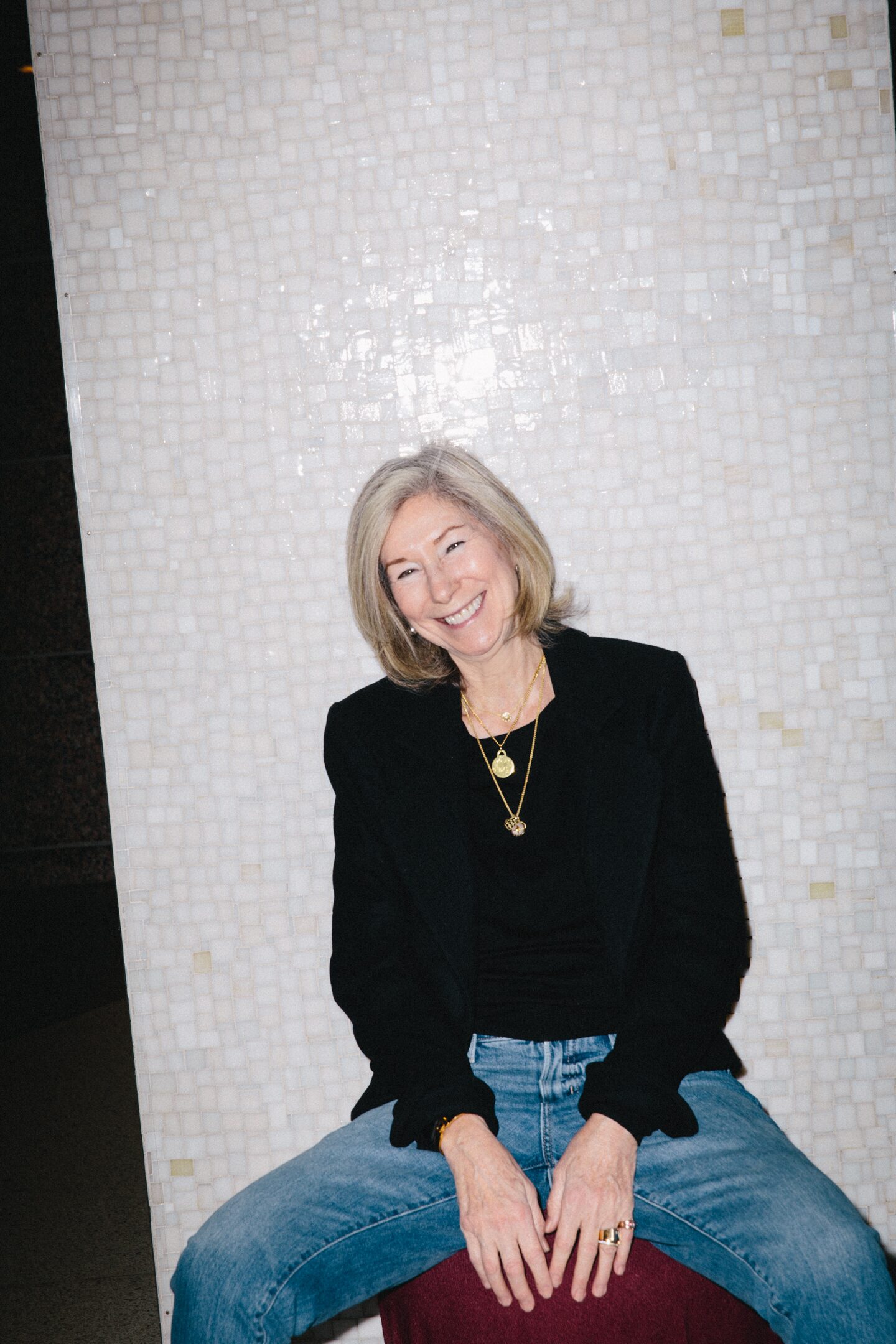
Tell us about your daily routine.
First, I give thanks for waking up and for a good night’s sleep. Then, I try stretching to avoid falling on my face when I get out of bed. Ray Romano said a really funny thing about getting older. He said, “Somehow, the other night, I realized that I had sprained my ankle in my sleep when I woke up in the morning.”
So, I do floor stretching exercises and have coffee, yogurt, and fruit for breakfast. And then I sit down to write. And the thing about doing the Substack is that readers are always writing to me, so there’s always some kind of engagement going on, which is wonderful.
My readership is amazingly smart and accomplished, which is an interesting point because it points out not so much about my writing but about how important beauty is to women of all kinds of intellectual interests.
“I love Tokyo. It’s very walkable and green”
How much time do you spend in Tokyo?
Because my family lives there, I spend as much time there as possible. I have a little apartment there; by little, I mean it’s the size of your palm.
I love Tokyo. It’s very walkable and green. And because of the Japanese culture, everything is pristine. And now, with GPS, it’s a cinch to get anywhere, since I don’t speak Japanese at all, but all you have to do is get in a cab and show the driver your address. The cabs are immaculate, you could eat off the floor, and the drivers wear suit jackets and white gloves. So, the visual aspect of the city is just beyond beautiful.
I also find the people very welcoming, even when they don’t speak English. And it’s fabulous fun to walk into any drugstore, stand in front of the beauty aisle, and stare at the plethora of products that don’t work but are offered for your pleasure. They’re particularly big on collagen supplements.
“AI can’t authentically get to the emotional aspect. Yet”
As a writer, how are you feeling about AI?
A couple of months ago, I asked AI a question. Something like, “How can I feel good about myself as I age in a culture that doesn’t value aging?” And I got back the most generic response. “Feel good about yourself. Do something for yourself that makes you feel good. Dress appropriately. Don’t try to look younger.” It’s baloney because AI can’t authentically get to the emotional aspect. Yet.
The main thing that worries me about AI is that, even though they know on some level how it works, the most technologically advanced scientists don’t really understand where it’s going. But I don’t think about it every day because I don’t think AI can write How Not to F*ck Up Your Face in a way that’s going to appeal to readers.
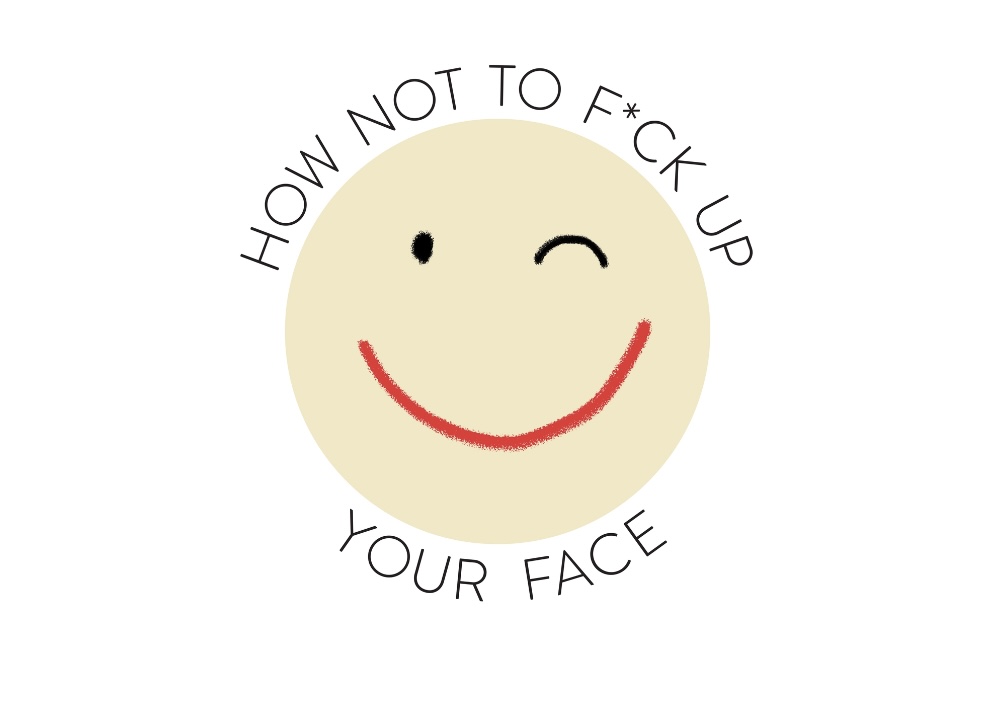
How are you feeling about age, personally?
I live in a neighborhood with a lot of older people. So, when I see an older person walking down the street all bent over a shopping cart, I can’t help thinking, “Oh, fuck.” Because the older I get, the closer I am to that. So, people in their late 40s or 50s seem like babies to me now. I think part of what keeps me youthful is the engagement I’m so happy to have.
“I think part of what keeps me youthful is the engagement I’m so happy to have”
What music are you listening to?
I love the jazz pianist Hiromi. I just saw her at the Blue Note here in New York. I love Gustav Mahler, Bernstein, Joni Mitchell.
How do you find living in New York at this stage?
I walk everywhere, and I go to the theater a lot. The culture here is incomparable, and you can get any food whenever you want. In the building I live in, I have everything I could want. The service people and the view are great, so I think it’s a great place to live as you age.
But recently, I’ve just had this urge to be in the countryside because I live in two cities. I read that Yoko Ono sold her place in the Dakota and moved to a farm, and I thought, “What a wonderful thing to do, as long as she’s got her own private doctor up there.”
What are three non-negotiables in life?
Kindness is one, gratitude is another. And I know how this sounds, but whenever I’m stuck with a problem, with a person, unless a person is psychotic, my go-to solution is to throw love at it, which is a third.
Is there anything that could revolutionize the beauty industry?
As long as the beauty industry relies on capitalism to survive, absolutely not. They found the magic beans that make you feel terrible about yourself and feed your yearning to look like someone else. A fundamental shift in values is needed for real change.
Connect with Val:
How Not To F*ck Up Your Face by Val Monroe
About Val
Cover image by David Harry Stewart.
LEAVE A REPLY
The ideas expressed here are solely the opinions of the author and are not researched or verified by AGEIST LLC, or anyone associated with AGEIST LLC. This material should not be construed as medical advice or recommendation, it is for informational use only. We encourage all readers to discuss with your qualified practitioners the relevance of the application of any of these ideas to your life. The recommendations contained herein are not intended to diagnose, treat, cure or prevent any disease. You should always consult your physician or other qualified health provider before starting any new treatment or stopping any treatment that has been prescribed for you by your physician or other qualified health provider. Please call your doctor or 911 immediately if you think you may have a medical or psychiatric emergency.



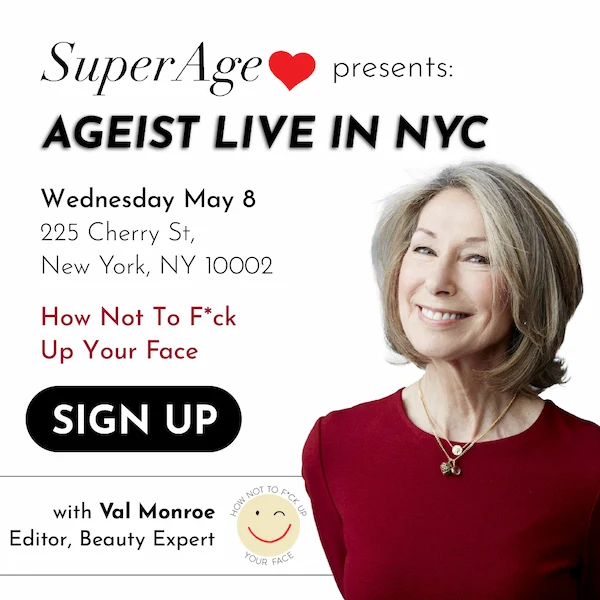
I love the eye meditation. It is very similar to an exercise from Neale Donald Walsch’s “Conversation With God” where we are to gaze into our eyes and try to connect with the deeper part of ourselves.
For the moment, we have this body. Yes we can take care of it or not, but at least for now, our body eventually breaks down and our body is no more. I choose to believe that our life does not end at that point, but we will have the chance to reflect on how we did this in this lifetime. I also believe that we should get the most out of this experience. Why not?
Brilliant, interesting article. I am 77 and agree with all Val writes, especially the last paragraph. Is there a link to Substack, I’d love to join it.
Many thanks
Liz: Thanks for your interest in HNTFUYF! You can read it here: valeriemonroe.substack.com
Thank you for the link to Substack 🙂
Val, this is why I love you! Run don’t walk to Val’s Substack and support her mission by becoming a paid subscriber which I have been for many years. She is the real deal! ❤️
Robin! A million thank you’s, as always! 🙏😘❤️
🥰
Love all the observations here. I feel sort of possessive, like “Hey, I knew Val before she was featured here!” Heh heh. It is so helpful to be reminded we’re in a bullsh-t situation with our society overvaluing the young, marketers capitalizing on our insecurities, etc.
Courtney, thanks for your support (and your possessiveness, which is kind of lovely). So glad to see you here, too! xo
❤️!
I’m 76 and would love to have this link!
https://valeriemonroe.substack.com
https://valeriemonroe.substack.com
Oops!
Love these comments Val is amazing and a source of tremendous info and inspo for so many of us.
Thank you, Sheri! I hope you’ll continue to read and enjoy HNTFUYF. Oh, and thank you, the divine Robin Bobbe!!!
I’m a longtime fan of Val’s and paid subscriber of HNTFUYF — love seeing her on the other side of the interview!
Thank you, Christine! xo
The description of the mirror exercise really hit me. Whenever I’m looking in the mirror it’s to do nothing BUT find my flaws! Even thinking about looking into my own eyes makes me very, very emotional. 🥺